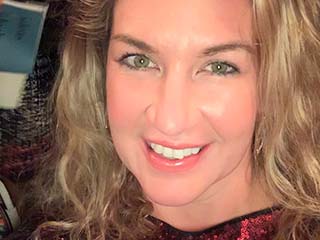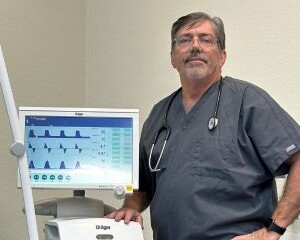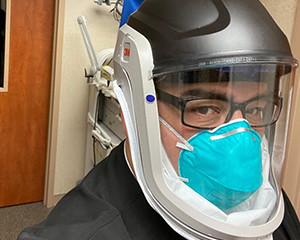Respiratory Therapist got her Bachelor’s degree to boost career and job opportunities
 A lot has changed for Respiratory Therapists since Jolene Wood decided to become one almost 30-years ago at age nineteen. School for a Respiratory Therapist was short and a degree at any level unnecessary. Although jobs were plentiful enough, salaries reflected the minimal training of the time.
A lot has changed for Respiratory Therapists since Jolene Wood decided to become one almost 30-years ago at age nineteen. School for a Respiratory Therapist was short and a degree at any level unnecessary. Although jobs were plentiful enough, salaries reflected the minimal training of the time.
“I graduated from a one-year Respiratory Therapy program in Arizona with a diploma – no degree,” she remembers. “It used to be more of a technical, on-the-job training kind of career years ago.”
The evolution of a Respiratory Therapist is slow but insistent. “To get a license you have to at least have an Associate’s degree – which is a step in the right direction,” says Jolene. “Now I think a Bachelor’s should be a minimum.” Potential for higher income rises with increased education and knowledge.
Times have changed for the level of education and professionalism required to be part of an elite medical team in Respiratory Care. “Our profession is lifting the bar for us to achieve higher professionalism and to be better educated,” says Jolene. “Those who are just certified and have years of experience can’t rely on that anymore. Their education and knowledge has to catch up with their years of experience.”
There was this feeling of being held back. Jolene had already gone from “certification to registry, then from registry to Associate’s degree, then started my Bachelor’s degree in 2009, but never finished,” she says. “I realized that just experience wasn’t going to carry me to the places I wanted to be.” She needed that advance degree.
Jolene wanted to get in front of that sharp curve just ahead, but after so many years of enjoying the independence of working in her chosen field, she couldn’t see herself sitting in a classroom. Plus, she needed a convenient schedule to balance against her work routine and commuting to a college campus would be time-consuming.
“I had done online classes before, so I knew this was much easier to integrate into my life,” she says. “SJVC classes (Bachelor of Science Respiratory Therapy – BSRT) were really fast and really advanced. It was more expensive, but I really wanted to finish quickly.
In the fall of 2018 Jolene enrolled in SJVC’s online BSRT program. Her husband, Paul, was on board with his full support. They were both happy to realize the ease with which online classes could mesh with home and work routines. They readily adopted a new normal.
Classes introduced Jolene to new concepts. Even though she had been in the Respiratory Care field for several years, she was surprised to discover some intriguing information. “Learning the background of management (positions) is important for everybody, even if they don’t go into that. It allows you to better understand where managers, supervisors and directors are coming from; how money is spent, how budgets are done and the allocation of funds.”
Jolene enjoyed the online classroom interaction. “Any time I needed access to instructors, it was easy,” she says. “I’m very social at work so sometimes it’s good to not have to be so personable in class (online); just go there, introduce yourself and get your work done. Not having to do that (engage on a personal level) is nice.”
The months whipped by and Jolene found herself to be the pleased recipient of a Bachelor of Science degree in Respiratory Therapy. Now she would use that accomplishment to enhance her employment and professional standing.
“Part of it is how you carry yourself and how you interact with your peers,” says Jolene. “You are better able to participate in those conversations at a higher level and get your point across (to peer professionals) in an educated manner and to patients. Your job is to be a part of and support the medical team, and you are a better part of that team if you speak the same language. You can’t do that without the education that comes from advanced credentialing.”
Jolene is always looking ahead. A Master’s degree is in her sightline. Having spent most of her Respiratory Therapy career working in the ICU (Intensive Care Unit) of medical facilities, she is well-adept at caring for those hanging most precariously to life. Another advance degree would allow her to bring even more talent, skill and knowledge to their care and survival.
She is always ready to lean into the winds of a difficult path.
“I’ve been working since I was nine,” Jolene explains. As one of seven children, their Midwestern family may not have had strong financial footing, but none ever imagined they didn’t have the personal fortitude to get what they needed through hard work. Her last two years of high school Jolene worked three jobs simultaneously. “I worked at a greasy spoon waitressing, Taco Bell in the evening and dishwashing and waitressing on the weekends.” Her strong work ethic was reinforced one hard-earned dollar at a time.
“It was expected that you work, that you were in school; we had paper routes, babysat,” she recalls. “The papermill was the go-to. We knew that if we wanted to have different things, it was our responsibility to earn them.”
She was well-prepared for life-long learning and what it would take to realize her education and career dreams. Jolene put it all into play when she decided to go back for that Bachelor’s degree through SJVC’s online division.
Balancing full-time work, full-time school and a full life could not have been as manageable as Jolene implies. But she is used to making hard things seem easy. “I don’t see it as hard; I just see it as something you put your mind towards. If you want it, you do it.”
Good advice from someone who is now enjoying the benefits of her mind-set.
You might also like
More stories about
Request Information
All fields using an asterik (*) are required.


